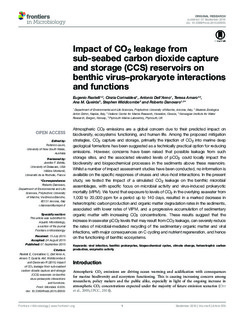Impact of CO2 leakage from sub-seabed carbon dioxide capture and storage (CCS) reservoirs on benthic virus-prokaryote interactions and functions
Rastelli, Eugenio; Corinaldesi, Cinzia; Dell'Anno, Antonio; Amaro, Teresa; Queirós, Ana M.; Widdicombe, Stephen; Danovaro, Roberto
Journal article, Peer reviewed
Published version
Permanent lenke
http://hdl.handle.net/11250/2507207Utgivelsesdato
2015Metadata
Vis full innførselSamlinger
- Publikasjoner fra Cristin - NIVA [2160]
- Scientific publications [1172]
Sammendrag
Atmospheric CO2 emissions are a global concern due to their predicted impact on biodiversity, ecosystems functioning, and human life. Among the proposed mitigation strategies, CO2 capture and storage, primarily the injection of CO2 into marine deep geological formations has been suggested as a technically practical option for reducing emissions. However, concerns have been raised that possible leakage from such storagesites, and the associated elevated levels of pCO2 could locally impact the biodiversity and biogeochemical processes in the sediments above these reservoirs. Whilst a number of impact assessment studies have been conducted, no information is available on the specific responses of viruses and virus host interactions. In the present study, we tested the impact of a simulated CO2 leakage on the benthic microbial assemblages, with specific focus on microbial activity and virus-induced prokaryotic mortality VIPM). We found that exposure to levels of CO2 in the overlying seawater from 1,000 to 20,000 ppm for a period up to 140 days, resulted in a marked decrease in heterotrophic carbon production and organic matter degradation rates in the sediments, associated with lower rates of VIPM, and a progressive accumulation of sedimentary organic matter with increasing CO2 concentrations. These results suggest that the increase in seawater pCO2 levels that may result from CO2 leakage, can severely reduce the rates of microbial-mediated recycling of these dimentary organic matter and viralin fections, with major consequences on C cycling and nutrient regeneration, and hence on the functioning of benthic ecosystems.

